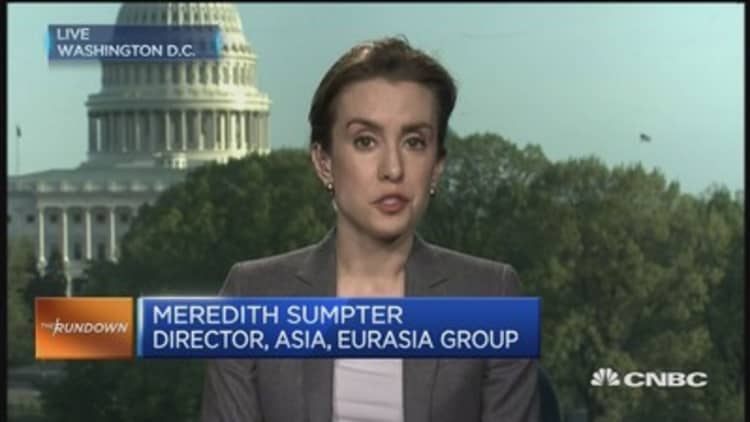
U.S. Vice President Mike Pence visits Indonesia on Thursday as part of his 10-day visit to Asia, and a range of topics will be on the docket.
There, Pence will be meeting Indonesian President Joko Widodo and Vice President Jusuf Kalla, as well as celebrating the 50th anniversary of the Association of Southeast Asian Nations (ASEAN) and the 40th anniversary of U.S. ties with the group.
Indonesia is the first Muslim-majority country Pence will be visiting. But despite President Donald Trump's tough rhetoric about the global religion, one top analyst said the main focus will not be discussing religious issues, but rather discussing the bilateral trade relationship between the two countries.
"In line with the political mandate of President Trump, we should watch for Mike Pence focusing part of his visit on expanding U.S. commercial ties within Indonesia," Meredith Sumpter, Asia director for the Eurasia Group, told CNBC's "The Rundown" on Wednesday.
The bilateral trade rhetoric is the central theme of Pence's visit to Asia, which aims to spread the message that Trump is open to boosting U.S. trade in Asia, despite abandoning the Trans-Pacific Partnership (TPP).
"The vice president is well aware that the U.S. needs to do more in the wake of walking away from the TPP to message U.S. economic staying power," Sumpter explained.
In his visit to Japan on Tuesday, Pence met with Japan's Deputy Prime Minister Taro Aso to discuss the possibility of a two-way trade pact with Japan. While both sides agreed to eliminate unfair trade practices, there were no concrete agreements on bilateral trade relations.
"When you look at the outcome of this initial economic dialogue channel with the deputies for both sides, what's notable is that there was no agreement to continue on with formal talks for a U.S.-Japan bilateral FTA," said Sumpter.
"This is a signal that PM (Shinzo) Abe is certainly intent on pursuing the TPP 11— so this would be the TPP, absent the U.S. — probably on account of a rising interest among the other TPP players to see what can be salvaged, even if the U.S. decides to continue to turn away from the TPP," she added.
Despite this, Sumpter said that the bilateral trade talks will continue throughout Pence's Asia tour.
"Washington is very intent on pursuing bilateral trade negotiations, not only with Japan, but with other trade partners in the region," she said.
"As we heard in South Korea and Japan, what we are likely to hear in Indonesia and Australia is the U.S. vice president messaging that despite walking away from a multilateral trade regime, the U.S. recognizes that its economic ties with Asia are central, and that the U.S. is going to find ways to invest in those relationships, notably with trade, and with trying to expand access for U.S. firms in the region," she added.
In addition to these trade talks, Sumpter said Pence is likely to discuss other issues surrounding national security, such as counter-terrorism and regional security issues.
"So the rising Muslim populism aside, I would expect that during this trip, the vice president will focus on the bilateral relationship, on ASEAN, on counter-terrorism, and also doubling down on what could be done to strengthen commercial ties between the two countries," she said.
Pence's visit to Indonesia is an important step "to reconfirm" the strategic partnership between the U.S. and Indonesia, Sumpter said.
"Indonesia is a massively important market, this is 40 percent of ASEAN, and there is a notable U.S. private sector presence in Indonesia, but much more could be done to expand that relationship," she added.

